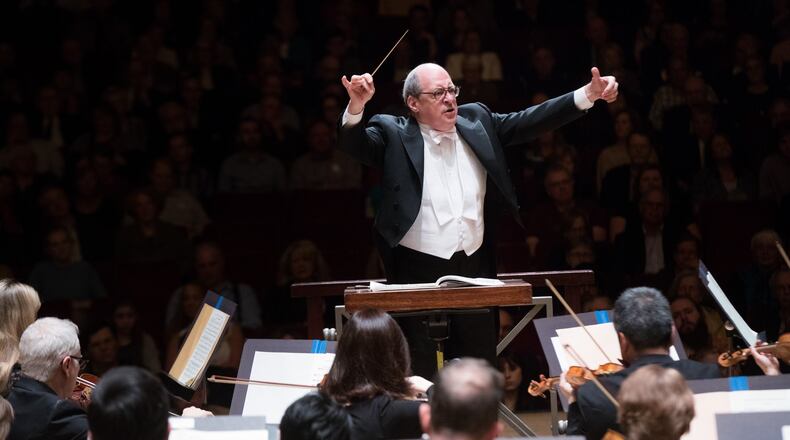Returning to the piano for an encore after an impassioned performance of Beethoven’s “Triple” concerto with cellist David Finckel and violinist Daniel Hope, Wu Han turned to the Symphony Hall crowd and shouted, full of exuberance, “How about more Beethoven?”
It was a rhetorical question, but the audience at Thursday night’s Atlanta Symphony Orchestra concert responded enthusiastically. The trio then launched into a bubbly Beethoven piano trio – the finale of Opus 1 No. 1. But the question needed to be asked: In the midst of the ASO’s two-year celebration of Beethoven and Bernstein, and with the composer’s 250th birthday party coming next season, is there such a thing as too much Beethoven? The answer is of course not.
The composer wrote both of the works on the first half of Thursday night’s program, which also included the “Egmont” Overture, within a decade of learning that, at just 30 years old, his hearing was deteriorating rapidly and would soon be gone forever. Instead of churning out bitter works full of self-pity, the composer wrote complex, radiant pieces of music for the rest of his life. A large portion of Beethoven’s most frequently performed works was composed in the first 10 years after his diagnosis.
The “Triple” performance was easily the highlight of the evening, which also included Robert Schumann’s Symphony No. 1. Han and Finckel are co-artistic directors of the Chamber Music Society of Lincoln Center, and their association with Hope runs deep. This close familiarity was obvious in their onstage interactions, and the intimacy came across in the music. During the “Triple” concerto, with the three musicians backed by a sympathetic and cautious ASO under the baton of music director Robert Spano, melodies seamlessly passed from one instrument to another, and the three moved together as one unit.
“Triple” has graced the stage in recent memory. In 2013, Spano sat at the piano for an all-ASO version, with concertmaster David Coucheron and former principal cello Christopher Rex. This time Spano, the ASO and its guests will take the “Triple” show on the road, traveling to the Savannah Music Festival on Sunday after a Friday performance at Symphony Hall.
Schumann’s “Spring” symphony is an exciting work full of color and darkness that last appeared on the Symphony Hall stage under the baton of guest conductor Jun Märkl in 2017. On Thursday, Spano led an ASO in top form, but the lustrous strings stood out: Strident, forceful violins opened the third movement with suitable, and thrilling, aggression. The performance was not without a few missteps – in the opening fanfare blast that begins the symphony, the brass section sounded less than surefooted.
The “Egmont” Overture, which opened the concert, began in a storm, and the ASO musicians attacked the initial melodic figure with seek-shelter uninhibitedness. The turbulence had a sunny undercurrent, though, and throughout the piece, glimmering harmonies emerged both in quiet meditation and in roaring passages. Composed as the incidental music to a performance of Johann Wolfgang von Goethe’s “Egmont” play, Beethoven crammed a range of emotions into the pithy, 9-minute piece. The music is evocative and captivating, and Spano and the ASO played up all the emotional changes to sublime effect.
CONCERT REVIEW
Atlanta Symphony Orchestra with Daniel Hope, David Finckel and Wu Han
Additional performance at 8 p.m. tonight. $22-$98. Symphony Hall, 1280 Peachtree St. NE, Atlanta. 404-733-5000, atlantasymphony.org.
7 p.m., March 30. $44-74. Savannah Music Festival. Lucas Theatre for the Arts, 32 Abercorn St., Savannah. 912-525-5040, lucastheatre.com
About the Author
Keep Reading
The Latest
Featured


